April 30, 2024 | 05:09 GMT +7
April 30, 2024 | 05:09 GMT +7
Hotline: 0913.378.918
April 30, 2024 | 05:09 GMT +7
Hotline: 0913.378.918
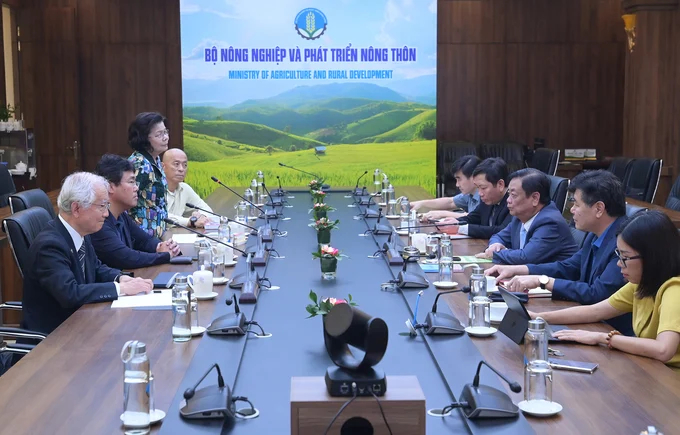
Minister Le Minh Hoan and several departments of the Ministry of Agriculture and Rural Development met with New Green Company's experts from Japan. Photo: Tung Dinh.
On the afternoon of April 12, Minister Le Minh Hoan and leaders from various units under the Ministry of Agriculture and Rural Development met with experts from Japan's New Green Agriculture Company for a collaborative session. The focus was on exploring the feasibility of employing Aigamorobo, a robotic solution designed to combat weed growth in rice fields without using chemicals.
During the product presentation, Mr. Tetsuya Nakamura, the creator of Aigamorobo, explained that this robot autonomously navigates through rice fields, agitating water and disturbing mud to obstruct sunlight, thereby inhibiting weed growth without relying on herbicides. Remarkably, this automated method does not compromise rice yield, unlike traditional wet-dry irrigation practices.
Furthermore, Aigamorobo demonstrates efficacy in repelling golden apple snails, promoting rice growth, and mitigating methane emissions by enhancing air circulation within the fields. A university experiment in Japan revealed a 50% reduction in methane emissions from rice fields where this robot was employed.
Mr. Nakamura emphasized, "This robot variant contributes to emissions reduction in rice fields, aligning with the Ministry of Agriculture and Rural Development's objective of cultivating 1 million hectares of high-quality, low-emission rice in the Mekong Delta."
Responding to this information, Minister Le Minh Hoan affirmed the product's suitability amid the current agricultural labor shortage and the imperative to reduce emissions during production. He expressed readiness to collaborate on testing the robot's application, particularly integrating it into the initiative to develop 1 million hectares of high-quality, low-emission rice in the Mekong Delta.
Additionally, the Minister highlighted Vietnam's transition towards organic agriculture, an area of interest for New Green's research, suggesting opportunities for further collaboration.
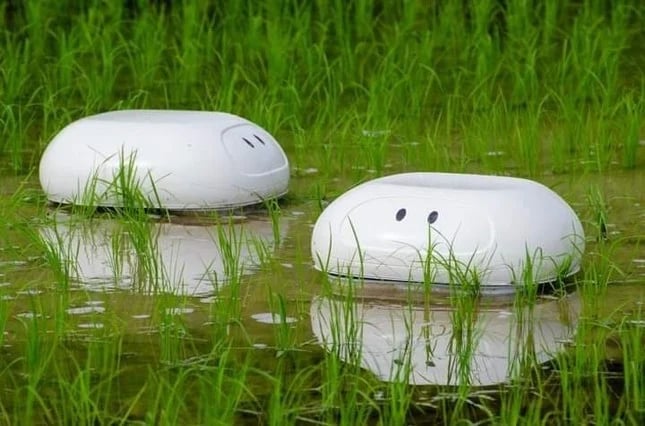
Robots combat weeds, control golden apple snails, and mitigate methane emissions without compromising rice productivity.
Regarding the insights from specialized agencies, Mr. Le Quoc Thanh, Director of the National Agricultural Extension Center (TTKNQG), expressed that the information about Aigamorobo is highly appealing as it addresses two primary challenges in Vietnam's rice production: weed infestation and the presence of golden apple snails, typically managed through chemical means. "This implies challenges related to chemical residues and environmental emissions," Mr. Le Quoc Thanh discussed with the Japanese counterparts.
Mr. Le Quoc Thanh further explained that the operational principle of this robot is similar to the traditional Vietnamese method of mud weeding but is enhanced with modern technology. Consequently, the National Center hopes to conduct field tests of this robot in Vietnam and provide assessments on its effectiveness within Vietnamese agricultural settings.
In addressing emission reduction concerns, Mr. Nguyen Do Anh Tuan, Director of the International Cooperation Department, emphasized the suitability of this product for Vietnam's initiative to develop 1 million hectares of high-quality, low-emission rice in the Mekong Delta. However, Mr. Nguyen Do Anh Tuan proposed that New Green collaborates with relevant organizations to validate the robot's emission-reducing capabilities in rice fields.
According to New Green, in Japan, the robots have demonstrated efficiency exceeding 70%, with 500 units already sold on the market and receiving commendation from Agriculture Ministers of G7 countries. Since September 2023, New Green's team of experts has introduced robots to universities, agricultural cooperatives, and agricultural corporations in Vietnam.
In January, New Green's experts visited rice production areas in the Mekong Delta, Ho Chi Minh City and Hanoi to assess the business landscape in Vietnam and identify suitable environments to introduce the robots, which operate without chemical herbicides.
Furthermore, New Green's team of experts engaged in discussions with the Academy of Agriculture, receiving a positive reception. In addition to collaborating with the Academy of Agriculture, New Green seeks to exchange ideas and cooperate with various Vietnamese rice research units.
The introduction of Aigamorobo represents a significant step towards sustainable agriculture in Vietnam. With its ability to combat weeds, control golden apple snails, and mitigate methane emissions without compromising rice productivity, this innovative technology holds promise for addressing key challenges the agricultural sector faces. As discussions progress and collaborative efforts with New Green deepen, there is optimism for leveraging this technology to enhance agricultural practices, promote environmental stewardship, and contribute to the nation's goal of developing high-quality, low-emission rice production.
Translated by Quynh Chi
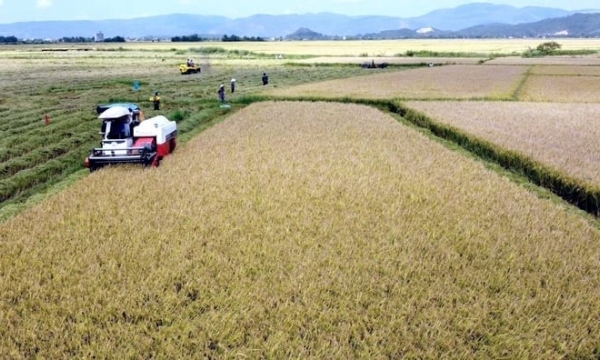
(VAN) Phu Yen is one of the localities with the conditions to develop high-tech agriculture, seafood processing and aquaculture.
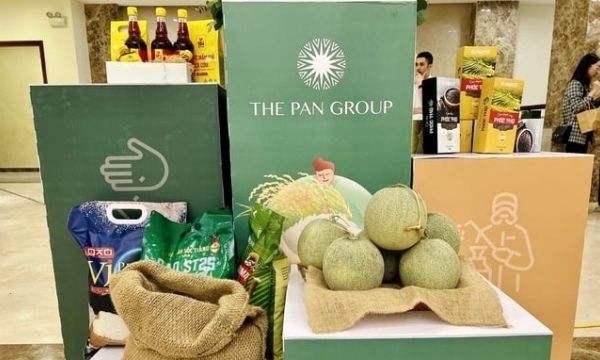
(VAN) In response to climate change concerns and economic challenges, PAN Group sets target of 12% revenue growth with natural agriculture solutions.
/2024/04/26/4910-3-173953_784.jpg)
(VAN) The Nestlé Net Zero Roadmap launched in 2020 has helped the Group transform its business operations and implement measures to reduce greenhouse gas emissions in all fields.
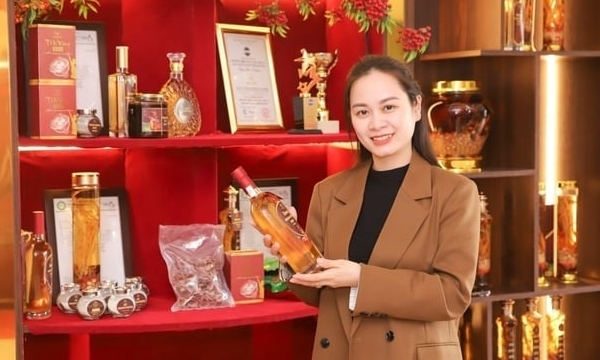
(VAN) Deer antler velvet is known as one of the 'Four Great Traditional Medicines'; however, the value-added aspect from the deep processing of deer velvet is currently overlooked.

(VAN) The three main factors causing the lack of sustainability in the growth of e-commerce in Vietnam are digital divide, digital workforce, and environment
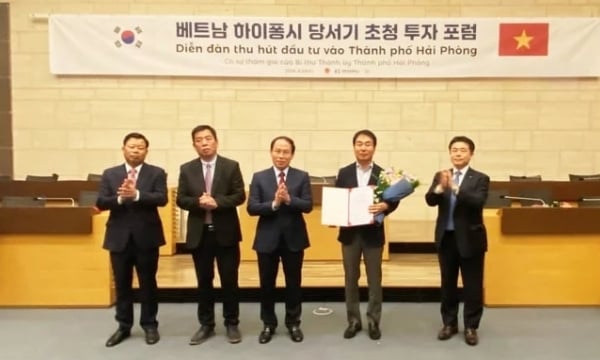
(VAN) South Korean enterprises have increased their investment capital in the city of Hai Phong by nearly VND 400 million following a series of meetings.
/2024/04/25/4132-3-083738_65.jpg)
(VAN) On the sandy area of Ly Trach commune, the model of growing Taiwan custard apples in a 'nature-based' direction has brought high economic efficiency.